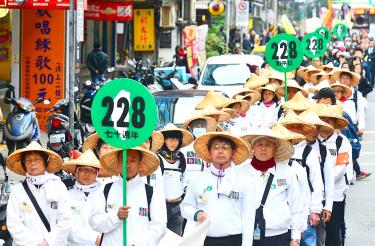Hundreds walk to mark 228 Incident
UNKNOWNWithout truth there can be no forgiveness, one activist said, calling for government action on transitional justice reforms, rather than empty gestures
By Abraham Gerber / Staff reporter
Hundreds of campaigners marched in Taipei yesterday to commemorate the 228 Incident, calling for the government to officially assign responsibility for the massacre which followed a 1947 protest.
Escalating protests swept Taiwan on Feb. 28, 1947, after Tobacco Monopoly Bureau agents confiscated contraband cigarettes from a woman outside Taipei’s Tianma Tea House (天馬茶房) on Nanjing W Road on Feb. 27. When the woman was hit on the head by an officer holding a gun, the crowd surrounded the agents, who responded by fleeing with one agent shooting into the crowd and killing a bystander.
A subsequent bloody crackdown by the then-Chinese Nationalist Party (KMT) regime systematically killed many Taiwanese.
Only partial documentation of the events and victims has been recovered, with the government-funded 228 Memorial Foundation officially recognizing more than 2,200 victims.
More than 26 groups were represented at yesterday’s march through key historic sites, but no individual banners were raised.
Campaigners solemnly read out the names of those who were killed or went missing in the Incident.
“As the victims are gradually forgotten, Feb. 28 has diminished into a holiday lacking emotion,” Nylon Cheng Liberty Foundation managing director Cheng Tsing-hua (鄭清華) said. “We are still at the starting line in terms of discovering the truth, because the identities of many victims and perpetrators are unknown.”
He called for the government to hasten passage of transitional justice legislation, which would establish a special committee with powers to investigate the Incident and other injustices under the then-KMT authoritarian rule.
Government discussions over the fate of the National Chiang Kai-shek (蔣介石) Memorial Hall were “more symbolic than substantial,” he said.
“The victims of the 228 Incident are not just those listed, its greatest victim was Taiwan itself, including the descendants of the perpetrators,” he said. “Without the truth, we do not have the preconditions for forgiveness.”
Cheng is a brother of democracy movement pioneer Deng Nan-jung (鄭南榕), who in 1987 spearheaded a national campaign for Feb. 28 to be designated a national holiday shortly after the lifting of martial law.
Veteran activists Chen Yung-hsing (陳永興) and Lee Sheng-hsiung (李勝雄), who collaborated with Deng, led yesterday’s procession as it wound its way from Nanjing W Road to the Executive Yuan, where troops fired into a crowd of protesters during the massacre. The building served as the headquarters of then-Taiwan Governor Chen Yi (陳儀).
The march also passed the former site of a Tobacco Monopoly Bureau office which was sacked the same day, and a radio station building which was occupied and used to spread word of the protests.
The procession concluded with a prayer and singing while participants scattered satin flower petals over white cloth to symbolize mourning.

No comments:
Post a Comment